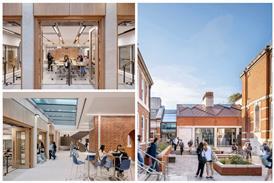Leighton Hospital in Cheshire found to contain reinforced auoclaved aerated concrete in 80% of its buildings
An NHS trust has launched a competition to design a new £740m hospital to replace existing facilities which are riddled with structurally unsound concrete.
Mid Cheshire Hospitals NHS Foundation Trust is looking for a lead architect to draw up plans for the replacement of Leighton Hospital Campus, which is affected by reinforced autoclaved aerated concrete (RAAC) through 80% of its buildings.
Practices have just over three weeks to send in tenders for the £4m contract, which is due to start this May and run for six years.

Leighton Hospital, near Crewe, was one of five major hospitals added to the government’s New Hospital Programme in May last year because they were found to contain large amounts of RAAC, a lightweight form of concrete which is prone to collapse without warning.
The government has said the presence of RAAC will “pose a significant risk to patients and staff” if the sites are not rebuilt by 2030.
The £20bn programme to build 40 new hospitals in England, first announced in 2020, was relaunched last year with a new plan called ‘Hospital 2.0’ which aims to speed up construction and reduce costs using modern methods of construction.
> Also read: Government announces £20bn New Hospital Programme relaunch
But the addition of the five RAAC hospitals, which have been prioritised, has pushed back the expected completion of eight schemes past their original 2030 deadline.
Leighton Hospital was opened in 1972 at a time when RAAC was widely used in the construction of large public buildings. Use of the material was phased out in the 1990s after it was found to have a design life of 30 years.
Mid Cheshire Hospitals NHS Foundation Trust said an integrated systems approach under ‘Hosptital 2.0’ will be “at the centre” of the redevelopment of the campus.
> Also read: Hospital programme design approach could result in buildings that are too small
The job will see the appointed design team cover RIBA stages 2 and 3 for the scheme and remain with the trust in an advisory capacity during construction phases instead of novating to a contractor team.
The trust added it will have the right to extend the contract beyond RIBA stage 3 without the need for a further procurement exercise if the practice has performed well.
The deadline for sending in requests to participate is 16 February, with invitations to tender expected to be dispatched on 7 March.
















1 Readers' comment